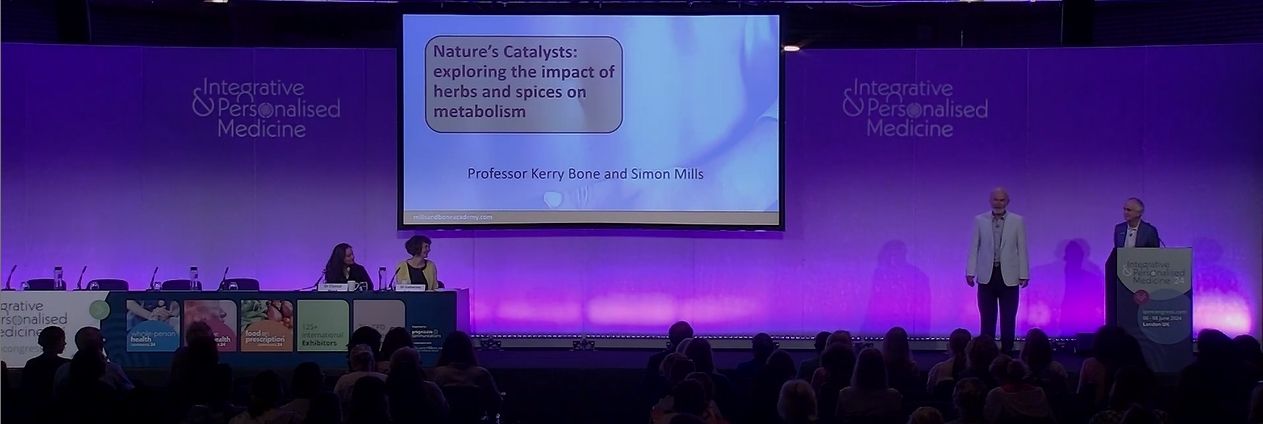Herbs, Spices, and Bitters: Nature's Secret Weapon for Metabolic Health

🏠︎ | Past Presentations | Food on Prescription | Impact of Herbs & Spices on Metabolism
-
Event: IPM Congress 2024
-
Date: 6th June 2024
-
By: Prof. Kerry Bone & Simon Mills
-
Estimated Read Time: 7–8 minutes
At the IPM Congress 2024, Prof. Kerry Bone and Simon Mills delivered an electrifying session titled “Nature's Catalysts: Exploring the Impact of Herbs and Spices on Metabolism for Optimal Health.” Renowned for their extensive contributions to herbal medicine, Mills and Bone have collaborated for over 30 years, blending academic rigor with practical applications to promote health through natural remedies. Their session illuminated the transformative potential of common herbs, spices, and bitters in addressing modern metabolic challenges such as obesity, cardiovascular diseases, and diabetes.
Mills and Bone’s presentation revealed an exciting yet practical premise: that simple, everyday ingredients found in our kitchens hold the power to combat complex health issues. Drawing on a rich tapestry of scientific evidence, the speakers highlighted how these natural elements can serve as cost-effective, accessible, and safe alternatives to pharmaceutical interventions.
The Metabolic Challenge: A Call for Natural Solutions
Modern lifestyles and diets have fueled an epidemic of metabolic disorders, including obesity, type 2 diabetes, and cardiovascular diseases. Prof. Bone began by underscoring how poor nutrition and lifestyle choices are at the heart of these global health issues. “The Western diet has become phytonutrient-deficient, largely due to industrial farming practices and the removal of key elements like bitters from our palettes,” Bone explained.
Instead of waiting years for pharmaceutical solutions, the duo proposed an immediate, practical approach: integrating scientifically supported herbs, spices, and bitters into daily routines. These natural ingredients have shown promise in addressing glycemic control, lipid metabolism, inflammation, and even gut microbiome health.
Scientific Foundations: The “Spice Up Your Life” Project
Central to their presentation was the “Spice Up Your Life” project—a collaborative scoping review conducted with King’s College London. This review synthesised data from randomised control trials on the metabolic effects of common herbs and spices. The findings were illuminating, providing robust evidence that ingredients like ginger, turmeric, fenugreek, and cinnamon can positively impact metabolic health.
Simon Mills elaborated: “Herbs and spices offer an unparalleled opportunity to improve our health. These are not exotic, hard-to-find substances—they’re right there in your kitchen, affordable, and easy to use.”
Cinnamon: The Importance of Proper Identification
While cinnamon is widely regarded as beneficial for glycemic control, Mills emphasised a significant problem in research—misidentification of species. Much of the clinical research has mistakenly used Cinnamomum cassia instead of Cinnamomum verum (Ceylon cinnamon), leading to inconsistent results. Mills advised sourcing high-quality Ceylon cinnamon to maximise its therapeutic benefits.
Top Performers: Ginger, Turmeric, and Fenugreek
Among the ingredients reviewed, ginger, turmeric, and fenugreek stood out for their consistent, evidence-backed benefits:
- Ginger: Known for its anti-inflammatory properties, ginger also stimulates thermogenesis (heat production), aiding in energy expenditure and fat metabolism.
- Turmeric: Rich in curcumin, turmeric supports lipid metabolism, reduces inflammation, and regulates blood sugar levels.
- Fenugreek: This versatile herb has shown promise in improving insulin sensitivity and reducing postprandial glucose spikes.
The Forgotten Heroes: Bitters in Metabolic Health
Prof. Bone introduced the audience to bitters, a long-overlooked component of traditional diets. Once a staple of herbal medicine, bitters have largely fallen out of favor due to their unappealing taste. However, modern science is rediscovering their profound impact on metabolic health.
Bitter Receptors: A Breakthrough in Understanding
Until recently, bitter receptors were thought to exist only on the tongue. However, research has identified their presence throughout the digestive tract and even in immune cells and other tissues. These receptors interact with bitter compounds to influence key metabolic hormones, including:
- GLP-1 (glucagon-like peptide-1): A hormone that reduces appetite, slows gastric emptying, and improves blood sugar control.
- PYY (peptide YY): A hormone that promotes satiety and regulates food intake.
Bone highlighted bitters’ ability to naturally stimulate these pathways, mimicking the effects of popular pharmaceutical GLP-1 agonists like semaglutide. “Unlike drugs, bitters offer these benefits without side effects. By reintroducing bitters into our diets, we can harness their metabolic power safely and effectively,” Bone remarked.
Practical Applications: Bitters in Everyday Life
Bitters such as andrographis, hops, and cardamom were spotlighted for their potent effects. Bone recommended incorporating bitters into meals or consuming them as herbal teas. For those adverse to their taste, he suggested capsules as an alternative. “Even in pill form, bitters can activate the receptors in your digestive tract and deliver their benefits,” Bone assured.
Evidence-Based Insights: Key Benefits of Herbs, Spices, and Bitters
The session highlighted several compelling findings:
-
Improved Glycemic Control: Herbs like cinnamon, ginger, and fenugreek have demonstrated significant effects in reducing blood glucose levels and improving insulin sensitivity.
-
Enhanced Lipid Metabolism: Spices such as turmeric and ginger help regulate lipid profiles, reducing the risk of cardiovascular diseases.
-
Reduced Inflammation: Many herbs and spices contain bioactive compounds that combat chronic inflammation—a major driver of metabolic syndrome.
-
Gut Microbiome Health: Ingredients like cardamom and bitters influence gut flora composition, promoting beneficial bacteria and reducing inflammation.
-
Thermogenesis and Appetite Regulation: Spices like ginger stimulate heat production, increasing energy expenditure, while bitters help regulate appetite and satiety.
A Call to Action: Reclaiming Phytonutrient-Rich Diets
Mills and Bone concluded with a passionate plea to reintroduce phytonutrient-rich herbs, spices, and bitters into daily life. They emphasised the importance of moving beyond processed foods and embracing nature’s offerings. “These natural solutions are not only effective but also accessible to everyone. By adding them back to our diets, we can take significant steps toward better metabolic health,” Mills asserted.
Bone ended the session with a thought-provoking statement: “Add bitterness back to your palette to take the bitterness out of your life.” This call to action encourages individuals to rethink their dietary choices, not only for health but also for a deeper connection to nature and tradition
Further Reading
For those interested in exploring more of Dr Deanna Minich’s work on Colour, Creativity, and Diversity in Nutrition, here are some recommended articles and resources:
Simon Mills
-
5 Herbs Instead of Anti-Inflammatories - Explores herbal alternatives to conventional anti-inflammatory medications.
-
Herbs that Heal with Simon Mills - A podcast episode discussing the healing properties of various herbs.
Prof. Kerry Bone
For more resources and transcribed sessions from the Food on Prescription Conference, visit our Food on Prescription Conference page.
Get Access to the Full Conference Recording!
Submit the form below to unlock the complete video recording - don't miss out on insights from leading experts and thought leaders!
)
)
)

.jpg.png)
|https://cdn.asp.events/CLIENT_Progress_084371A2_5056_B739_5406DC209314F095/sites/IPM-2025/media/libraries/exhibitors/Apex-Energetics.png/fit-in/640x9999/filters:no_upscale())
|https://cdn.asp.events/CLIENT_Progress_084371A2_5056_B739_5406DC209314F095/sites/IPM-2025/media/libraries/exhibitors/Pure-Encapsulations-NEW3.jpg/fit-in/640x9999/filters:no_upscale())
|https://cdn.asp.events/CLIENT_Progress_084371A2_5056_B739_5406DC209314F095/sites/IPM-2025/media/libraries/exhibitors/Nordic labs NEW.png/fit-in/640x9999/filters:no_upscale())
|https://cdn.asp.events/CLIENT_Progress_084371A2_5056_B739_5406DC209314F095/sites/IPM-2025/media/libraries/exhibitors/Nelsons Corporate logo.jpg/fit-in/640x9999/filters:no_upscale())
|https://cdn.asp.events/CLIENT_Progress_084371A2_5056_B739_5406DC209314F095/sites/IPM-2025/media/libraries/exhibitors/Lingo_Made-by-Abbott-002-crop.png/fit-in/640x9999/filters:no_upscale())
|https://cdn.asp.events/CLIENT_Progress_084371A2_5056_B739_5406DC209314F095/sites/IPM-2025/media/libraries/exhibitors/Venn-Healthcare.png/fit-in/640x9999/filters:no_upscale())
|https://cdn.asp.events/CLIENT_Progress_084371A2_5056_B739_5406DC209314F095/sites/IPM-2025/media/libraries/exhibitors/Pharma-Nord-logo-full-size.jpg/fit-in/640x9999/filters:no_upscale())
|https://cdn.asp.events/CLIENT_Progress_084371A2_5056_B739_5406DC209314F095/sites/IPM-2025/media/libraries/exhibitors/Vibrant-Wellness.png/fit-in/640x9999/filters:no_upscale())
|https://cdn.asp.events/CLIENT_Progress_084371A2_5056_B739_5406DC209314F095/sites/IPM-2025/media/libraries/exhibitors/Nutrined.png/fit-in/640x9999/filters:no_upscale())
|https://cdn.asp.events/CLIENT_Progress_084371A2_5056_B739_5406DC209314F095/sites/IPM-2025/media/libraries/exhibitors/QMed-Swiss-crop.png/fit-in/640x9999/filters:no_upscale())
|https://cdn.asp.events/CLIENT_Progress_084371A2_5056_B739_5406DC209314F095/sites/IPM-2025/media/libraries/exhibitors/Vitaspan.png/fit-in/640x9999/filters:no_upscale())
|https://cdn.asp.events/CLIENT_Progress_084371A2_5056_B739_5406DC209314F095/sites/IPM-2025/media/libraries/exhibitors/Maven-Health.png/fit-in/640x9999/filters:no_upscale())
|https://cdn.asp.events/CLIENT_Progress_084371A2_5056_B739_5406DC209314F095/sites/IPM-2025/media/libraries/exhibitors/HumanFirst.jpg/fit-in/640x9999/filters:no_upscale())
|https://cdn.asp.events/CLIENT_Progress_084371A2_5056_B739_5406DC209314F095/sites/IPM-2025/media/libraries/exhibitors/Hardy-Nutritionals.jpg/fit-in/640x9999/filters:no_upscale())
|https://cdn.asp.events/CLIENT_Progress_084371A2_5056_B739_5406DC209314F095/sites/IPM-2025/media/libraries/exhibitors/W_Wellness.png/fit-in/640x9999/filters:no_upscale())
|https://cdn.asp.events/CLIENT_Progress_084371A2_5056_B739_5406DC209314F095/sites/IPM-2025/media/libraries/exhibitors/Nuzest-logo.png/fit-in/640x9999/filters:no_upscale())
|https://cdn.asp.events/CLIENT_Progress_084371A2_5056_B739_5406DC209314F095/sites/IPM-2025/media/libraries/exhibitors/Oryx.jpg/fit-in/640x9999/filters:no_upscale())
|https://cdn.asp.events/CLIENT_Progress_084371A2_5056_B739_5406DC209314F095/sites/IPM-2025/media/libraries/exhibitors/Microba.jpg/fit-in/640x9999/filters:no_upscale())
|https://cdn.asp.events/CLIENT_Progress_084371A2_5056_B739_5406DC209314F095/sites/IPM-2025/media/libraries/exhibitors/BlueOak.png/fit-in/640x9999/filters:no_upscale())
|https://cdn.asp.events/CLIENT_Progress_084371A2_5056_B739_5406DC209314F095/sites/IPM-2025/media/libraries/exhibitors/Dimples.png/fit-in/640x9999/filters:no_upscale())
|https://cdn.asp.events/CLIENT_Progress_084371A2_5056_B739_5406DC209314F095/sites/IPM-2025/media/libraries/exhibitors/BetterYou.jpg/fit-in/640x9999/filters:no_upscale())
.png/fit-in/320x9999/filters:no_upscale()|https://cdn.asp.events/CLIENT_Progress_084371A2_5056_B739_5406DC209314F095/sites/IPM-2025/media/libraries/exhibitors/MicrosoftTeams-image-(3).png/fit-in/640x9999/filters:no_upscale())
|https://cdn.asp.events/CLIENT_Progress_084371A2_5056_B739_5406DC209314F095/sites/IPM-2025/media/libraries/exhibitors/L-Nutra-Health.png/fit-in/640x9999/filters:no_upscale())
|https://cdn.asp.events/CLIENT_Progress_084371A2_5056_B739_5406DC209314F095/sites/IPM-2025/media/libraries/exhibitors/ABNOBA.jpg/fit-in/640x9999/filters:no_upscale())
|https://cdn.asp.events/CLIENT_Progress_084371A2_5056_B739_5406DC209314F095/sites/IPM-2025/media/libraries/exhibitors/GLXG.png/fit-in/640x9999/filters:no_upscale())
|https://cdn.asp.events/CLIENT_Progress_084371A2_5056_B739_5406DC209314F095/sites/IPM-2025/media/libraries/exhibitors/Eagle-Clinical.png/fit-in/640x9999/filters:no_upscale())
|https://cdn.asp.events/CLIENT_Progress_084371A2_5056_B739_5406DC209314F095/sites/IPM-2025/media/libraries/exhibitors/Regenerative-Omegas_Ahiflower.png/fit-in/640x9999/filters:no_upscale())
|https://cdn.asp.events/CLIENT_Progress_084371A2_5056_B739_5406DC209314F095/sites/IPM-2025/media/libraries/exhibitors/Virun.jpg/fit-in/640x9999/filters:no_upscale())
|https://cdn.asp.events/CLIENT_Progress_084371A2_5056_B739_5406DC209314F095/sites/FIMedicine-2022/media/libraries/exhibitors/Altruvita.png/fit-in/640x9999/filters:no_upscale())
|https://cdn.asp.events/CLIENT_Progress_084371A2_5056_B739_5406DC209314F095/sites/IPM-2025/media/libraries/exhibitors/Terranova.png/fit-in/640x9999/filters:no_upscale())
|https://cdn.asp.events/CLIENT_Progress_084371A2_5056_B739_5406DC209314F095/sites/FIMedicine-2022/media/libraries/exhibitors/Proven-Biotics.png/fit-in/640x9999/filters:no_upscale())
|https://cdn.asp.events/CLIENT_Progress_084371A2_5056_B739_5406DC209314F095/sites/IPM-2025/media/libraries/exhibitors/PROTINA.jpg/fit-in/640x9999/filters:no_upscale())
|https://cdn.asp.events/CLIENT_Progress_084371A2_5056_B739_5406DC209314F095/sites/IPM-2025/media/libraries/exhibitors/RegenerusLabs.png/fit-in/640x9999/filters:no_upscale())
|https://cdn.asp.events/CLIENT_Progress_084371A2_5056_B739_5406DC209314F095/sites/IPM-2025/media/libraries/exhibitors/Rayonex-hi-res.jpg/fit-in/640x9999/filters:no_upscale())
|https://cdn.asp.events/CLIENT_Progress_084371A2_5056_B739_5406DC209314F095/sites/IPM-2025/media/libraries/exhibitors/Bristol-Fungarium.png/fit-in/640x9999/filters:no_upscale())
|https://cdn.asp.events/CLIENT_Progress_084371A2_5056_B739_5406DC209314F095/sites/IPM-2025/media/libraries/exhibitors/Doctors-Data.png/fit-in/640x9999/filters:no_upscale())
|https://cdn.asp.events/CLIENT_Progress_084371A2_5056_B739_5406DC209314F095/sites/IPM-2025/media/libraries/exhibitors/TheraLogo_2_Grey_v2.png/fit-in/640x9999/filters:no_upscale())
|https://cdn.asp.events/CLIENT_Progress_084371A2_5056_B739_5406DC209314F095/sites/IPM-2025/media/libraries/exhibitors/Pure-Maintenance-NEW.png/fit-in/640x9999/filters:no_upscale())
|https://cdn.asp.events/CLIENT_Progress_084371A2_5056_B739_5406DC209314F095/sites/IPM-2025/media/libraries/exhibitors/TotallyDerma.png/fit-in/640x9999/filters:no_upscale())
|https://cdn.asp.events/CLIENT_Progress_084371A2_5056_B739_5406DC209314F095/sites/IPM-2025/media/libraries/exhibitors/Natroceutics.png/fit-in/640x9999/filters:no_upscale())
|https://cdn.asp.events/CLIENT_Progress_084371A2_5056_B739_5406DC209314F095/sites/IPM-2025/media/libraries/exhibitors/OMED-Health.jpg/fit-in/640x9999/filters:no_upscale())
|https://cdn.asp.events/CLIENT_Progress_084371A2_5056_B739_5406DC209314F095/sites/IPM-2025/media/libraries/exhibitors/Tigon.jpg/fit-in/640x9999/filters:no_upscale())
|https://cdn.asp.events/CLIENT_Progress_084371A2_5056_B739_5406DC209314F095/sites/IPM-2025/media/libraries/exhibitors/Ancient---Brave.png/fit-in/640x9999/filters:no_upscale())
|https://cdn.asp.events/CLIENT_Progress_084371A2_5056_B739_5406DC209314F095/sites/IPM-2025/media/libraries/exhibitors/Wild-Nutrition_2.png/fit-in/640x9999/filters:no_upscale())
|https://cdn.asp.events/CLIENT_Progress_084371A2_5056_B739_5406DC209314F095/sites/IPM-2025/media/libraries/exhibitors/DR.Vegan.png/fit-in/640x9999/filters:no_upscale())
|https://cdn.asp.events/CLIENT_Progress_084371A2_5056_B739_5406DC209314F095/sites/IPM-2025/media/libraries/exhibitors/Nutri-Link.png/fit-in/640x9999/filters:no_upscale())
|https://cdn.asp.events/CLIENT_Progress_084371A2_5056_B739_5406DC209314F095/sites/IPM-2025/media/libraries/exhibitors/BodyBio-NEW.jpg/fit-in/640x9999/filters:no_upscale())
|https://cdn.asp.events/CLIENT_Progress_084371A2_5056_B739_5406DC209314F095/sites/IPM-2025/media/libraries/exhibitors/Herrens-Mark.png/fit-in/640x9999/filters:no_upscale())
|https://cdn.asp.events/CLIENT_Progress_084371A2_5056_B739_5406DC209314F095/sites/IPM-2025/media/libraries/exhibitors/BioCare_Logo_750x750.jpg/fit-in/640x9999/filters:no_upscale())
|https://cdn.asp.events/CLIENT_Progress_084371A2_5056_B739_5406DC209314F095/sites/IPM-2025/media/libraries/exhibitors/AONM.jpg/fit-in/640x9999/filters:no_upscale())
|https://cdn.asp.events/CLIENT_Progress_084371A2_5056_B739_5406DC209314F095/sites/IPM-2025/media/logos/HifasDaTerra.png/fit-in/640x9999/filters:no_upscale())
|https://cdn.asp.events/CLIENT_Progress_084371A2_5056_B739_5406DC209314F095/sites/IPM-2025/media/libraries/exhibitors/Keto-Mojo-Logo.new.jpg/fit-in/640x9999/filters:no_upscale())
|https://cdn.asp.events/CLIENT_Progress_084371A2_5056_B739_5406DC209314F095/sites/IPM-2025/media/libraries/exhibitors/KBMO-Diagnostics.png/fit-in/640x9999/filters:no_upscale())
|https://cdn.asp.events/CLIENT_Progress_084371A2_5056_B739_5406DC209314F095/sites/IPM-2025/media/libraries/exhibitors/Lamberts-NEW.png/fit-in/640x9999/filters:no_upscale())
|https://cdn.asp.events/CLIENT_Progress_084371A2_5056_B739_5406DC209314F095/sites/IPM-2025/media/libraries/exhibitors/Bare-Biology-Logo.jpg/fit-in/640x9999/filters:no_upscale())
|https://cdn.asp.events/CLIENT_Progress_084371A2_5056_B739_5406DC209314F095/sites/IPM-2025/media/libraries/exhibitors/Metagenics.jpg/fit-in/640x9999/filters:no_upscale())
|https://cdn.asp.events/CLIENT_Progress_084371A2_5056_B739_5406DC209314F095/sites/IPM-2025/media/libraries/exhibitors/FunctionalMind.png/fit-in/640x9999/filters:no_upscale())
|https://cdn.asp.events/CLIENT_Progress_084371A2_5056_B739_5406DC209314F095/sites/IPM-2025/media/libraries/exhibitors/Really-Healthy-NEW.png/fit-in/640x9999/filters:no_upscale())
|https://cdn.asp.events/CLIENT_Progress_084371A2_5056_B739_5406DC209314F095/sites/IPM-2025/media/logos/Geneva.png/fit-in/640x9999/filters:no_upscale())
|https://cdn.asp.events/CLIENT_Progress_084371A2_5056_B739_5406DC209314F095/sites/IPM-2025/media/logos/Helixor70.jpg/fit-in/640x9999/filters:no_upscale())
|https://cdn.asp.events/CLIENT_Progress_084371A2_5056_B739_5406DC209314F095/sites/IPM-2025/media/libraries/exhibitors/The-Natural-Dispensary-NEW.jpg/fit-in/640x9999/filters:no_upscale())
|https://cdn.asp.events/CLIENT_Progress_084371A2_5056_B739_5406DC209314F095/sites/IPM-2025/media/libraries/exhibitors/Invivo.png/fit-in/640x9999/filters:no_upscale())
|https://cdn.asp.events/CLIENT_Progress_084371A2_5056_B739_5406DC209314F095/sites/IPM-2025/media/libraries/exhibitors/Iscador.jpg/fit-in/640x9999/filters:no_upscale())
|https://cdn.asp.events/CLIENT_Progress_084371A2_5056_B739_5406DC209314F095/sites/IPM-2025/media/logos/LifecodeGX.jpg.png/fit-in/640x9999/filters:no_upscale())
|https://cdn.asp.events/CLIENT_Progress_084371A2_5056_B739_5406DC209314F095/sites/IPM-2025/media/libraries/exhibitors/Viridian-Logo---MASTER-V3_Viridian-Logotype---Tag.png/fit-in/640x9999/filters:no_upscale())
|https://cdn.asp.events/CLIENT_Progress_084371A2_5056_B739_5406DC209314F095/sites/IPM-2025/media/libraries/exhibitors/Weleda-NEW.png/fit-in/640x9999/filters:no_upscale())
|https://cdn.asp.events/CLIENT_Progress_084371A2_5056_B739_5406DC209314F095/sites/IPM-2025/media/libraries/exhibitors/CytoplanCropped.jpg/fit-in/640x9999/filters:no_upscale())
|https://cdn.asp.events/CLIENT_Progress_084371A2_5056_B739_5406DC209314F095/sites/IPM-2025/media/libraries/exhibitors/Balance-Healthcare-New.png/fit-in/640x9999/filters:no_upscale())
|https://cdn.asp.events/CLIENT_Progress_084371A2_5056_B739_5406DC209314F095/sites/IPM-2025/media/libraries/exhibitors/OxfordHealthspan1.png/fit-in/640x9999/filters:no_upscale())
|https://cdn.asp.events/CLIENT_Progress_084371A2_5056_B739_5406DC209314F095/sites/IPM-2025/media/libraries/exhibitors/Colab-Services.jpg/fit-in/640x9999/filters:no_upscale())
|https://cdn.asp.events/CLIENT_Progress_084371A2_5056_B739_5406DC209314F095/sites/IPM-2025/media/libraries/exhibitors/BOIRONcrop.jpg/fit-in/640x9999/filters:no_upscale())
)
)
)
-(1).png/fit-in/150x9999/filters:no_upscale())
)
)
)
)
)
)
)
)
)
)
)
)
)
)
)
)
)
)
)
)
)
)
)
---RGB---web.jpg.png/fit-in/150x9999/filters:no_upscale())
---RGB---web.jpg.png/fit-in/150x9999/filters:no_upscale())
)
)
)
)
)
)
)
)
)
)
)
)
)
)
)
)
)
.png/fit-in/150x9999/filters:no_upscale())
)
)
)
)
)
)
)
)
)
)

)
)
)
